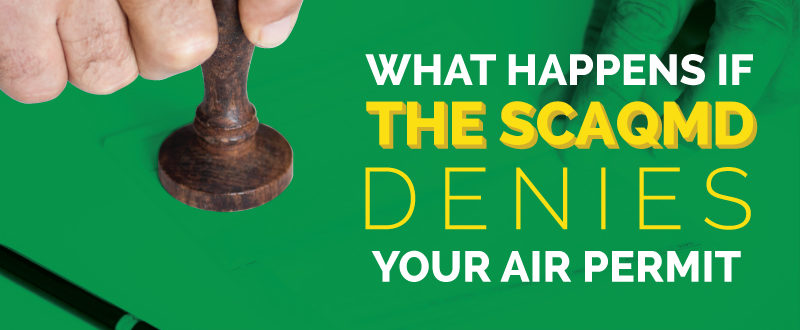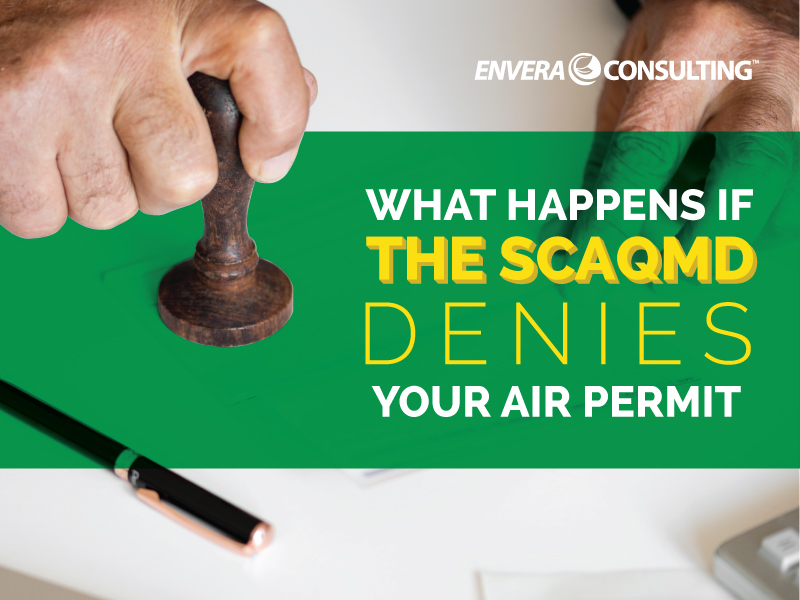

For any project, the issuance of a permit from the SCAQMD is a major milestone. Once the permit is issued, equipment deliveries can be set, contractors can be hired, and — most importantly — work on the project can start.
While I like to take a glass-half-full approach to life, the reality is that permit denials do happen. But that doesn’t mean that’s the end of the story. Even after a denial, you still have options.
Common Reasons for Permit Denials
While there are multiple reasons why a permit might be denied, the most common is when the equipment cannot be expected to comply with all the applicable regulations. Pretty obvious.
Another reason, found in Rule 210, is that the SCAQMD can deny a permit if the applicant has not provided all the required information to deem the application complete within 120 days of filing. Once you submit your permit application, the SCAQMD engineer reviews the material and determines if the application can be deemed complete so that the engineer can start processing the application.
In the case that your application cannot be deemed complete, the SCAQMD will reach out to you with an additional information (AI) request. If you receive an AI, always reply to the permit engineer as soon as possible, even if that means just letting them know when they can expect the requested information. If you’re slow in getting back to them, Rule 210 allows the SCAQMD to flat-out deny your permit if you are not responsive. So don’t dilly-dally!
On a side note, the SCAQMD can also deny your permit under Rule 210 for reasons that pertain to the California Environmental Quality Act (CEQA) process, although that’s a topic for another article.
If you’re a Title V facility, there’s the additional possibility that can be a factor in whether a permit gets issued or denied: Either the EPA or the public can take issue and provide comments that could lead to the denial of your permit application. When this happens, it usually means either that one of these two parties has developed a concern that the proposed equipment cannot comply with the current rules or that the regulatory agency has failed to consider a specific rule(s) for the proposed equipment during the permitting process.
The Denial Cometh
If the SCAQMD denies your permit, Rules 210 and 214 require that the agency notify you within 30 days why your application is being denied. In addition, once the denial is issued, Rule 214 states that another application for the piece of equipment cannot be submitted unless the applicant has resolved the reasons for the denial of the permit.
However, Rule 215 states that you can assume your permit has been denied if the SCAQMD has “[failed] to either approve or deny the application for a permit to construct within the time period specified by Rule 210(d).” In other words, you can assume that your permit is denied if you do not hear from them within the 120-day timeline noted in Rule 210. However, the SCAQMD is pretty good about reaching out to you within the 30-day window. If you haven’t received a notification, check with your permit engineer.
Appealing the Denial
Got denied? All hope is not lost. You can still file an appeal with the SCAQMD’s Hearing Board.
Per Rule 216, you have 30 days from the date of the written denial notification to file an appeal. File the appeal with the Clerk of the Board, using the specific SCAQMD Hearing Board form. The filing must include the completed original (printed, single-sided) as well as eight copies of the form (which can be printed double-sided). The written appeal must be submitted along with the required filing fee noted in Rule 303, Table III (currently $282.34 if you’re a small business and $1,889.19 if you’re not, based on the May 4, 2018 version of the rule).
Unless the Hearing Board determines another timeline, the hearing should start within 30 days of the Board receiving your appeal application. At the hearing, you will have an opportunity to present your evidence, documentation, and witnesses. The Board then decides to either uphold or reverse the SCAQMD’s initial decision.
While the SCAQMD does have a mechanism to appeal a denied permit, in our experience, it’s quite rare to need to go down this road, as the SCAQMD’s permit engineers really work with you to be sure that your equipment can be permitted. Obviously, this assumes that you are either aware of all of the SCAQMD’s requirements or have hired a consultant to guide you in the process.